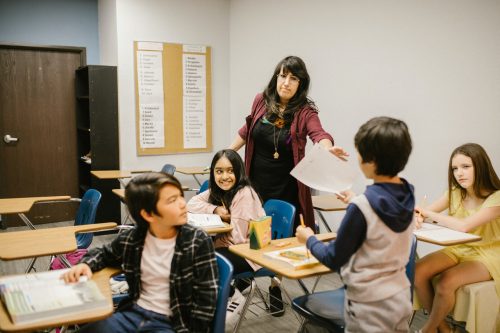Counselors and therapists have always been a part of all types of educational institutions. For these professionals, the holistic development of students is the main priority.

They help students with special needs realize their potential and grow in the best way they can. This task proves essential, ideally for unique high school learners with extraordinary needs at the crossroads of their future and career paths. But counseling can do more than guide teenage learners with particular needs when considering their future. Counseling can also help learners who are under special needs education programs and who have exceptional necessities.
Relevance Of Counseling For Kids With Particular Requirements/Benefits Of Counseling For Kids Requiring Mental Help
But what is the importance of counseling? Will it affect learners with conditions in exceptional education services? Before we can answer this question, we must first identify a child with different requirements now.
Professional Counselors Can Help Particular Children Who Have Problems And Disabilities
There are various types of children with disabilities and other requirements. The definition of unique needs pertaining to a child includes a wide variety of higher-level conditions, including physical ailments, learning difficulties or disabilities, and terminal illnesses. Learners may be unable to perform in school activities, like sports or simple reading exercises, due to their inherent particular necessities.
Here are just some examples of disabilities a child may have:
- Anxiety disorder
- Attention-deficit hyperactivity disorder (ADHD)
- Autism spectrum disorder (ASD)
- Dyslexia, dyscalculia, down syndrome, and other learning disabilities
- Hearing, visual, and other sensory impairment
- Oppositional defiant disorder (ODD)
- Physically disabled children
- Speech and language disorders
Learners with unique requirements also include those with an advanced intellect. Talented and unique learners with special requirements often possess leadership, creativity, communication skills, idea, and intelligence well beyond what’s expected of their age. They often feel underwhelmed by the lack of challenge in their schools.
But children with mental, emotional, and physical disabilities aren’t the only kinds of learners with exceptional educational requirements. Those who are at a disadvantage or have a harder time learning because their brains cannot take it are also unique learners who have certain necessities.
Now, and especially during the pandemic, special education and health continues to be exceptional and a privilege.
Learners who have particular educational requirements need superior connectivity to the internet to join classes and find resources. They should also have at least one gadget of their own to submit class requirements on their school and education. Different instructional strategies should also be used for students with educational requirements in classroom interventions for autism.
Moreover, students with disabilities face special point challenges and require additional support from their particular education teacher as well as their parents in order to achieve success and participation. In order to provide students with disability with the best possible education, schools must create a curriculum that is tailored to attend to their individual essentials while also allowing them to access mainstream educational opportunities with typically developing learners. An important aspect of this is providing these children with peers who can offer them support and understanding.
Private and public schools and particular educators must also ensure that students with special needs have access to the best technology and accommodations available in order to fully participate in their educational environment and that they can learn things easily.

While these problems may be difficult to solve, their consequences can be controlled. Luckily, counselors can help with most of these issues. Now, let’s talk about the benefits counseling gives.
Counseling For The Needs of Differently Abled Learners
First, counseling can help in identifying students that need exceptional education. With their background, they can pick up on actions and social cues signaling a student’s difficulty integrating with a group as part of their online group therapy.
For example, children with learning disabilities may look as if they’re the same way as other ordinary kids. Individuals with disabilities may only begin to show signs of their specific learning disabilities or intellectual disabilities when reading, writing, or solving problems. So, while they may seem well-adjusted at first, students with learning disabilities who need special education may progress slower in time.
Children who have developmental expressive language disorder (DELD) also often have difficulty expressing their thoughts and emotions.
Because of this, they may need special education services. Fortunately, they can learn about and develop thought processes and expression. Counseling can help children with DELD to learn how to express themselves better.
Students with disabilities often require ideally designed instruction, materials, and adapted equipment to achieve success in handling ADHD in the classroom setting and address learning differences. The term special education services are tailored to meet the varying degrees of learning requirements of students with disabilities and involve specially designed instruction, parent training, and other support services.
In addition to special education services, parents of children with developmental delays play an important role in helping the community succeed in school and beyond. Parent training provision programs provide parents with research-backed strategies to better understand their child’s disability and how to help them succeed academically.
Another example would be children having physical disabilities. While their conditions aren’t limitations themselves, they can still hinder them from socializing in fear of being different. This fear may be hard to identify, specifically, if a child is already very reserved.
Additionally, certain students with advanced talents and intelligence may feel underwhelmed. This feeling can then lead to demotivation as they continue to yearn for more challenging activities. Studies also show how this demotivation can then result in underachieving and underdeveloped children.
Luckily, a counselor can identify these challenges in children with disabilities. Identifying problems may only be the first step, but it’s essential in helping children with particular educational requirements.

Once counselors identify which students have disabilities and which essentials they require, they can start working on these limitations.
For special students having learning disabilities, counselors can help them slowly learn techniques to make academic requirements bearable.
Counseling can help them improve their time management and organization skills. They can also help special learners create study habits fitting to their inherent limitations.
On the other hand, counselors can also design exceptional education programs for specially disabled students. During counseling, counselors can also evaluate the benefits and detriments of their SPED programs. Special education programs may include these changes:
- Assistive learning devices
- Educational and psychological assessments
- Modified learning environment
Thus, pupils can learn the same lessons as their classmates, thanks to new teaching methods of special education teachers that consider their limitations.
All of this development usually happens during one-on-one sessions with a counselor. However, counseling can also be done by the group.
During such sessions, students who have special needs can improve their social, communication, and other interpersonal skills. They can also build friendships in small counseling groups. Learners having particular needs can then rely on this newly-found relationship for support, even after counseling ends.
Lastly, counseling can help learners who have demands under special education act idea gain self-confidence. Counselors can also help these children learn more about their respective conditions.
One of the hot discussions for the disabled community is the Identity-first language. The identity-first language movement aims to break any stigma or negative connotations previously associated with terms such as “disabled” or “autistic.” This movement thus promotes the use of such terms when describing a disabled person.
On the other hand, some people prefer the person-first language. This movement, on the other hand, seeks to recognize people first before their disabilities.
But at the end of the day, the child in question deserves to decide how they want to be referred to. Counseling can thus help children discover their strengths and weaknesses. With the proper disabilities education act about their limitations, children can learn to accept their condition and build an identity from there.

In conclusion, counselors in the school setting do more than just talk to learners in detention or help the soon-to-be-graduates transition. But also, counselors help the disabled, marginalized, and limited children. It is important to provide individuals with disabilities education because it is their right as well.
Counselors In Schools Do More To Help The Disabled, Marginalized, and Students Who Have Particular Requirements
Schools across the country are committed to providing inclusion for learners with special needs. Every school office focus and caters to the needs that have to be addressed so these educated learners receive services with the rigorous and comprehensive education they deserve.
It does so by identifying problems early on, even for those learners with seemingly hidden disabilities. After this first step, counselors can then speak and help these children work on their weaknesses and limitations. Most importantly, counseling helps special students with special needs finally embrace their inherent disabilities and build their own strong identities.
Frequently Asked Questions
How do you deal with learners who have special needs?
What is a person with special needs?
What are the 4 types of special needs?
How can you help a person with special requirements?
How can teachers help learners with disabilities?
What are important qualities you should have if you want to effectively teach learners with special requirements?
What are the most significant roles of a special needs teacher?
Why do you need more effort and patience in dealing with special needs learners?
Are special needs categorized as a disability?
What are the most challenging obstacles for a child who has special needs?
What are the goals and objectives of learners who have special needs?
What is the importance of special needs education?
What are the five ideas for handling special learners?
Why is it important to support children who have special requirements?
What are special needs in learning?
